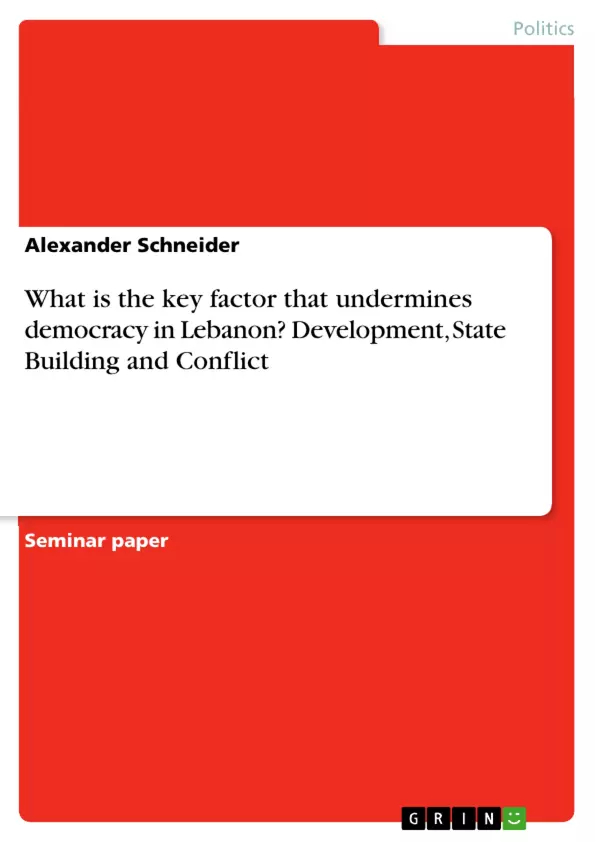The political system in Lebanon remained paralyzed in 2015, leaving the presidency vacant since the expiration of the last term in May 2014, while extending the National Assembly’s term twice since 2013. Furthermore, due to the still ongoing civil war in Syria and the immediate threat of the so-called Islamic State, the country is facing a wave of more than one million registered Syrian refugees as well as a direct involvement in the conflict by the Islamist militant group and political party Hezbollah. The case of the Palestinian refugees permanently living in Lebanon for decades is a still long-lasting issue for the Lebanese society and is in need of setting a new concept for a successful integration of the Palestinians into the political framework of the country.
The object of this paper is to work out the theoretical background of Lebanon’s “partly free” political system, giving a review on the country’s history from the period of the Ottoman Empire until now in the second part, then analyzing in the main part the various factors, which play an important role in the democratization process as well as apply the previously specified theories and approaches to the actual challenges the country is still facing in its political life. In addition to that, several reformation proposals will be critically described and interpreted in order to work out the quintessence of the challenges Lebanon has to cope with in its near future.
Inhaltsverzeichnis (Table of Contents)
- Introduction
- Theoretical Background
- Democracy
- Societionalism (Confessionalism)
- History of the conflict:
Zielsetzung und Themenschwerpunkte (Objectives and Key Themes)
This paper explores the factors hindering democracy in Lebanon, specifically focusing on the country's historical context, its unique political system, and the challenges arising from confessionalism and its impact on the democratization process.
- Confessionalism and its influence on Lebanon's political system
- The role of historical events in shaping the current political landscape
- The impact of internal and external conflicts on democracy in Lebanon
- Analysis of the challenges and opportunities for democratic reform
- Evaluation of proposed solutions and their potential effectiveness
Zusammenfassung der Kapitel (Chapter Summaries)
- Introduction: This chapter provides an overview of the current political situation in Lebanon, highlighting the challenges and complexities faced by the country, including the ongoing Syrian civil war and the presence of Syrian refugees. It also introduces the key question addressed in the paper: What is the key factor undermining democracy in Lebanon?
- Theoretical Background: This chapter establishes the theoretical framework for the analysis, presenting definitions and key concepts related to democracy and confessionalism. It explores Robert A. Dahl's criteria for a democratic process and examines the unique socio-political system of confessionalism in Lebanon, tracing its origins and analyzing its implications for the country's political landscape.
- History of the conflict: This chapter delves into the historical context of Lebanon, tracing its evolution from the Ottoman Empire through the French Mandate period to the present day. It analyzes the impact of significant historical events, including the Arab-Israeli Wars and the Lebanese Civil War, on the country's political development and the dynamics between different religious and ethnic groups.
Schlüsselwörter (Keywords)
Key terms and concepts explored in this paper include democracy, confessionalism, sectarianism, Lebanon, political system, democratization, conflict, civil war, Syrian refugees, Palestinian refugees, historical analysis, and proposed reforms.
Frequently Asked Questions
What is the main factor undermining democracy in Lebanon?
The primary factor is the system of confessionalism (sectarianism), which distributes political power based on religious affiliation, often leading to paralysis and corruption.
How has the Syrian civil war affected Lebanon's political stability?
The conflict has led to a massive wave of Syrian refugees, immediate security threats from groups like ISIS, and direct military involvement by Hezbollah.
What are the challenges regarding Palestinian refugees in Lebanon?
Palestinians have lived in Lebanon for decades without full integration, creating long-standing social and political tensions that require a new conceptual framework.
What historical periods are crucial to understanding Lebanon's current state?
Key periods include the Ottoman Empire, the French Mandate, the Arab-Israeli Wars, and the devastating Lebanese Civil War.
Are there any proposals for democratic reform in Lebanon?
Yes, various reforms have been proposed to move away from sectarian quotas toward a more meritocratic and unified democratic system, though implementation remains difficult.
- Citation du texte
- Alexander Schneider (Auteur), 2016, What is the key factor that undermines democracy in Lebanon? Development, State Building and Conflict, Munich, GRIN Verlag, https://www.grin.com/document/489696



